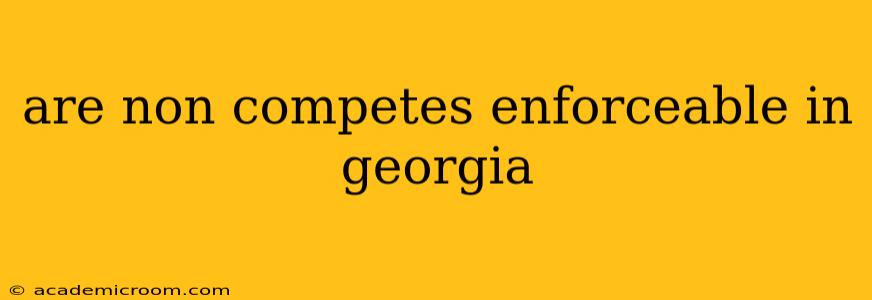Georgia law recognizes the enforceability of non-compete agreements, but with significant limitations. Simply put, they're not automatically enforceable; courts scrutinize them carefully to ensure they're reasonable and protect legitimate business interests. This means a company can't just slap a broad non-compete on an employee and expect it to hold up in court.
What Makes a Non-Compete Enforceable in Georgia?
To be enforceable, a Georgia non-compete agreement must meet several key criteria:
-
Reasonable in Scope: The restrictions on time, geographic area, and activities must be reasonable. A court will consider the specifics of the employee's role, the nature of the employer's business, and the competitive landscape. An overly broad restriction, encompassing a vast geographic area or an unreasonably long time period, is likely to be deemed unenforceable.
-
Protects a Legitimate Business Interest: The non-compete must protect a legitimate business interest of the employer. This typically involves trade secrets, confidential information, customer relationships, or goodwill developed by the employee during their employment. A non-compete designed simply to prevent an employee from earning a living is generally unenforceable.
-
Consideration: The employee must receive something of value in exchange for agreeing to the non-compete. This could be initial employment, a promotion, a raise, continued employment, or other tangible benefits. Simply continuing existing employment is often considered sufficient consideration.
-
Clearly Written and Understandable: The agreement must be clear, concise, and easily understandable. Ambiguous or confusing terms can lead to the entire agreement being deemed unenforceable.
What if a Non-Compete is Too Broad?
If a court finds a non-compete agreement to be too broad, it typically won't simply invalidate the entire agreement. Instead, the court might reform or "blue pencil" the agreement, modifying the terms to make it reasonable. This process narrows the scope of the restrictions to encompass only what's necessary to protect the employer's legitimate business interests.
What Happens if My Non-Compete is Challenged in Court?
If an employee challenges a non-compete in court, the employer bears the burden of proving its enforceability. This involves demonstrating that all the elements mentioned above are met. The court will carefully examine the specific facts of the case and the language of the agreement. Failure to meet these requirements can lead to the non-compete being deemed invalid and unenforceable.
How Long is a Non-Compete Typically Enforceable in Georgia?
There's no magic number for the length of a non-compete in Georgia. Reasonableness is key. A court will consider the specifics of each case. Longer periods might be acceptable for protecting highly specialized skills or significant trade secrets, while shorter periods may be appropriate for less sensitive information.
What Geographic Area Does a Non-Compete Cover in Georgia?
Similar to the time limitation, the geographic scope depends on the specifics of the business and the employee's role. A court will consider the area where the employer operates and the employee's interactions with clients or customers. Again, reasonableness is the deciding factor.
Can I Negotiate the Terms of a Non-Compete Agreement?
Absolutely! You are not obligated to sign a non-compete agreement as presented. You have the right to negotiate the terms, particularly if you feel the restrictions are too broad. Seeking legal advice before signing is highly recommended. A lawyer can help you understand your rights and negotiate a more favorable agreement.
This information is for educational purposes only and should not be considered legal advice. If you have specific questions about a non-compete agreement, you should consult with an experienced Georgia employment lawyer.
